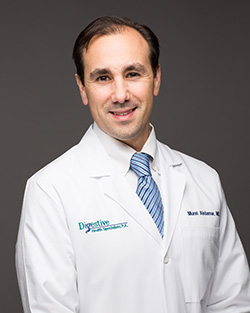Pancreatic Cancer With Dr. Akdamar
Pancreatic Cancer is on the top of everyone’s mind, with the unfortunate passing of Alex Trebek, the long-time host of Jeopardy. Dr. Murat Akdamar saw it essential to provide more information on this disease. In the videos below, he tackles the most common questions about pancreatic cancer.
Facts you should know:
- Pancreatic cancer affects about 55,000 people a year in the United States
- It accounts for 7% of all cancer deaths
- Treatment typically includes surgical resection if the tumor is detected before it has invaded other surrounding structures. Chemotherapy also is a part of the treatment course.
- Only approximately 15% of people who are diagnosed are candidates for surgical resection. Of those, 85% have a recurrence within 2 years.
- It is considered such a devastating disease because only 3-6% of all patients diagnosed survive 5 years. So, early detection is key.
What is pancreatic cancer?
Although there are a few forms of pancreatic cancer, the most common is adenocarcinoma, and unfortunately, it is the most aggressive. The pancreas is an organ that lies behind the stomach in the upper mid-abdomen. The pancreas makes digestive enzymes that help you break down your food. It also makes the insulin that regulates your blood sugar as well as other important hormones.
What are the symptoms of pancreatic cancer?
Pancreatic cancer often presents with vague symptoms which is why it is often not diagnosed in an early stage. Since it is not found until it is advanced, this leaves no good treatment options.
A few common symptoms are:
- Jaundice – yellowing of the eyes and skin (usually a late symptom)
- Loss of appetite and eventual weight loss
- Upper abdominal pain and/or upper back pain
- Diabetes
- Diarrhea with greasy stools
It is very important to understand that these are vague symptoms that are common and can be associated with conditions that are not pancreatic cancer.
What are the risk factors of pancreatic cancer?
- Smoking
- Age over 60
- Diets high in red and processed meats and excessive alcohol consumption are likely causative factors
- Obesity
- Family history of pancreatic cancer (two or more 1st-degree relatives or one who was diagnosed at age 50)
- Race (ethnicity): African Americans or Ashkenazi Jews
So, while this can be a very scary topic, I encourage everyone to focus on making good lifestyle choices to lower their risk for pancreatic cancer, and, again, discuss with your Digestive Disease Specialists provider any concerns or possible symptoms.
Can I do a screening test to detect pancreatic cancer earlier?
There is no good screening test for pancreatic cancer. It is often diagnosed with a CT scan of the abdomen. If you have any concerns, you should discuss it with your Digestive Health Specialist provider.
Final Thoughts from Dr. Akdamar
Did Dr. Akdamar answer the questions you had about this condition?
Board-Certified Gastroenterologist
He works at our Tanglewood and Winston-Salem locations.
Learn more about him here: https://digestivehealth.ws/provider/murat-akdamar-md/
Digestive Health Specialists, PA is here to help if you, or someone you know, would like more information, or if you are experiencing any digestive health symptoms and would like further evaluation. Feel free to give us a call at 336-768-6211 or fill the form below.






